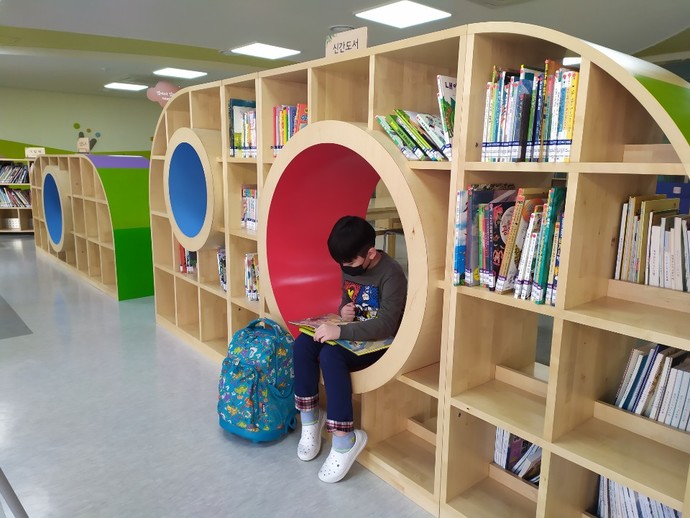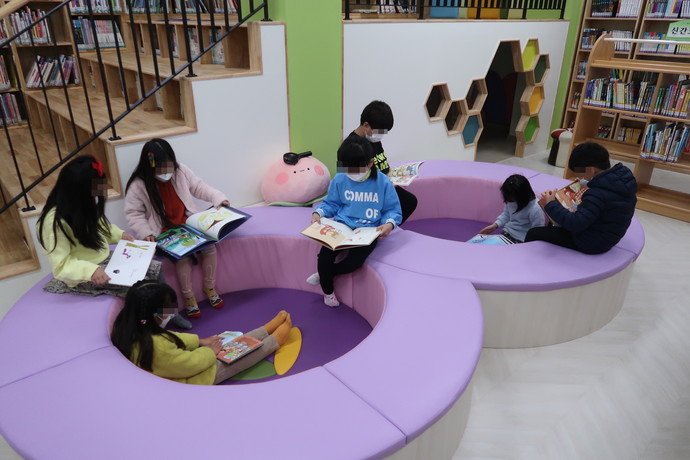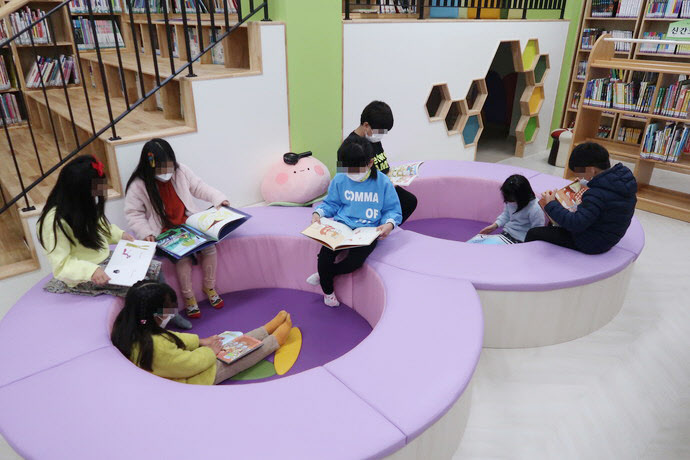Last year, 100 ‘restructured projects’ were transformed to create a pleasant environment and stimulate reading
Specialized librarian deployment rate of 99%… ‘Cooperative class time’ with teachers increased by 27.3%.
Encouraging a ‘gap-filling’ atmosphere at the provincial education office… Training on how to recognize fake news.
School libraries are transforming into bright, soft spaces. It’s not just the space that’s changing. It’s not just the space that’s changing, either. We’re expanding our programs and adding rooms to make it a fun place for students to visit.
We visited a school library in Gyeonggi-do, where students develop their creativity and potential by reading carefully selected books by professional librarians.

Before (left) and after remodeling of the Uijeongbu Uisun-cho Library. Courtesy of Gyeonggi Provincial Office of Education
■ Colorful school libraries today
The Uisun Elementary School Library in Buyong-ro, Uijeongbu-si, which I recently visited.
The first thing I noticed was the pleasant environment, which was different from what I had imagined a school library to look like. The openly arranged space, colorful chairs and tables, and well-organized bookshelves were attractive enough to stimulate the desire to read just by entering. The flooring and fluffy sofas on one side of the library were designed for curling up and reading, and I could imagine elementary school students curled up on the warm floor, giggling and reading a good book.
The Uisun-cho Library was recently remodeled after being selected as a target of the Gyeonggi-do Office of Education’s school library restructuring project last year. The provincial education office invested 20.4 billion won in 100 schools in the province to improve the space of school libraries to make them more suitable for educational activities and to use them as spaces for play and creative activities. As a result, 100 old school libraries have been transformed into unique hubs.
“When we started remodeling the library, we set the goal of creating a library that students would want to go to and a library that they would feel comfortable in, and we thought a lot about it,” said Kim Sung-soo, principal of Uisuncho School. “Thanks to the participation of school members and various efforts, we now have a library that we can be proud of wherever we put it.”
This year, the provincial education office will continue to support the restructuring of 37 school libraries. Schools that are more than 15 years old tend to have poorer library facilities, which the MOE plans to improve by steadily securing funding.

A student reads at The Hye Yum Library at Cheongnim Elementary School in Hwaseong, Korea.
■ 99% librarian placement rate… Increase classroom utilization
Gyeonggi-do’s library policy is not just about expanding facilities. It is also working on various policies to increase utilization, such as increasing professionalism and encouraging students to use the library more comfortably.
Professional librarians are essential to the smooth operation of school libraries, and Gyeonggi-do’s school libraries have a 99 percent staffing rate, one of the highest in the country.
The provincial education office also encourages various utilization classes and cooperative classes to help students familiarize themselves with the library and stay longer. Last year, 257,568 hours of library utilization classes were held in elementary, middle, and high schools in Gyeonggi-do. This is a 66.5% increase from the previous year (154,726 hours in 2022). This means that 34,120 teachers taught 14,332 subjects in school libraries during the year.
The number of hours of library collaboration between librarians and classroom teachers also increased by 27.3% from the previous year (56,629 hours) to 72,083 hours last year.
The efforts of the MOE to make libraries more familiar to students are paying off. Last year, 3.088 million students in the province participated in reading education programs at school libraries, up 34% from 2.34 million in 2022.

Students gather to read books at an elementary school in Gyeonggi Province. /Provided by Gyeonggi Provincial Office of Education
■ School libraries bring books closer to students and integrate them into lessons
This year, the Seoul Metropolitan Office of Education will set three policy directions to create school libraries full of more learning and more students, and will implement them in earnest.
First, we will create a reading culture and support reading education at the students’ level. To help students get closer to books during the time they spend at school, we will induce ‘niche immersion’ reading for 20 minutes, and create an atmosphere of reading through niche reading kings and niche reading books. In addition, students will be encouraged to select and book-curate books every month and make book recommendations to increase their interest in books and eliminate resistance to reading.
Second, it will strengthen the connection between classes and school libraries. The municipal education bureau will provide in-depth classroom support for teachers and provide utilization training to enhance students’ literacy skills. It will implement the ‘Baro Book’ program, where materials needed for classes are purchased and provided directly without going through a separate review process, and provide training on the use and utilization of school libraries to improve students’ ability to distinguish between fake news and genuine information.
Third, we plan to strengthen the capacity of school libraries and reorganize the space so that they can develop further. This includes customized training to strengthen practical skills, running research groups, and restructuring the space.
Gyeonggi-do Superintendent Lim Tae-hee said, “It is often said that reading is a sitting trip, and traveling is reading while traveling. Traveling and reading are activities that directly or indirectly provide the nourishment needed for growth in terms of gaining new experiences.” “We will continue to expand the functions of school libraries and combine them with enriching educational programs to help students grow up healthy with books,” said Gyeonggi-do Superintendent Lim Tae-hee.
